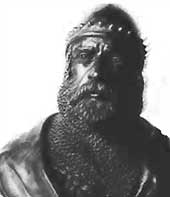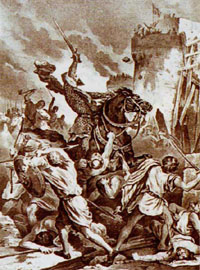El Cid
1094 - 1238
 At the end
of the turbulent 11th century, when the newly independent Balansiya had
to dispute conflicts with its new Muslim neighboors, the city was taken
by the notorius El Cid in 1094, five years before the first fall of Jerusalem.
The siege was brutal and his rule was heavy. The suffering population
was relieved in 1102, three years after his death by a Almoravid invasion.
The Almoravid army were called upon from North Africa to help hault the
Castillian Re-Conquista. Once the Almoravids besieged Balansiya, the Christian
garrison saw that they had no chance, burned the city and left. At the end
of the turbulent 11th century, when the newly independent Balansiya had
to dispute conflicts with its new Muslim neighboors, the city was taken
by the notorius El Cid in 1094, five years before the first fall of Jerusalem.
The siege was brutal and his rule was heavy. The suffering population
was relieved in 1102, three years after his death by a Almoravid invasion.
The Almoravid army were called upon from North Africa to help hault the
Castillian Re-Conquista. Once the Almoravids besieged Balansiya, the Christian
garrison saw that they had no chance, burned the city and left.
Hollywood portrays El Cid as an idealistic hero-liberator of the Re-Conquista.
It wasn't quite like that, though...
Rodrigo Diaz de Vivar was nicknamed El Cid Campeador for his impressive
one-on-one fighting skills (El Cid = sir, lord in Andalusi Arabic and
Campeador = one-on-one champion fighter in Spanish). This respectful nickname
in both Arabic and Spanish reflects his twisted loyalties.
He started as a vassal of Castilian king and went quite far up the ladder.
But he had an "abrasive personality" and fell out of favour.
He continued as a mercenary general for both Muslim and Christian kingdoms
until he decided to carve out a piece for himself, in addition hyped up
on the buzz of the Crusades. He first defeated Ramon Berenguer II of Barcelona,
then married his daughter to Ramon's son to cover his back, and then exploited
an uprising in Balansiya to lay siege. The siege lasted 18 months, it
was a brutal ordeal with much starvation horror within the walls, until
the city finally fell in May 1094. Officially El Cid ruled under the Castilian
crown. In reality, he had his own ephemeral Crusader kingdom.
 To
some extent he integrated the Moorish population into the administration
and the military. On the other hand, he expelled many Moors beyond the
city walls and exploited them as slaves. All of the mosques were converted
into churches and the Moors had no access to the centre of the city. It
was a dark time of oppression for the Moors of Balansiya. To
some extent he integrated the Moorish population into the administration
and the military. On the other hand, he expelled many Moors beyond the
city walls and exploited them as slaves. All of the mosques were converted
into churches and the Moors had no access to the centre of the city. It
was a dark time of oppression for the Moors of Balansiya.
El Cid did not ride out his corpse into the battle. He died quietly in
his home 3 years before the Muslims counter-attacked. For those three
years the confused city ruled by his wife was steadily losing the plot
until the Almoravid "liberation army" sweeped through Spain
and appeared at the city walls. Cid's wife fled with his body and the
garrison followed, after burning the city.
Far from being a romantic ballade of a hero Defender of Christ, Cid's
story did, however, survive the centuries at a high volume. An interpretation
of such fame lies, perhaps, in the magnitute of Cid's rise through the
ranks. Born at the bottom of the noble ladder, Cid ended up virtually
the king of one of the most powerful kingdoms on the Iberian Peninsula
of those times, making his way as a mere soldier with a sword. His story
was a fairytale of a medieval American Dream. And while he didn't do any
miracles politically or culturally, he was most certainly an inspiring
portrait of a warrior knight.
Balansiya remained Muslim for over a century more. The times were not
as great as before, though, with conflicts and economic problems. An agressive
Christian kingdom of Castilla was gaining ground, approaching Balansiya.
The Christian Re-Conquista was going full speed. With heavy hearts and
fears for the future, the Moors heavily fortified the walls of Balansiya,
preparing to meet the agressor...
Map: Location
of Muslim Valencia
|